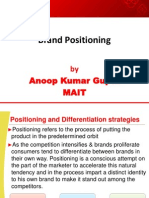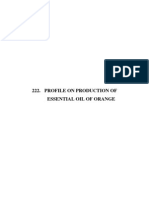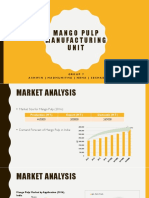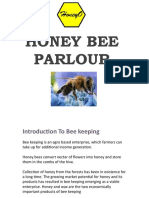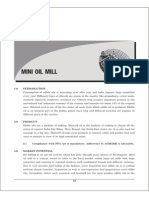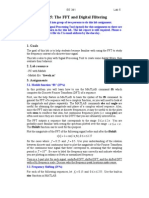Professional Documents
Culture Documents
Coconut Products: 1.0 Product and Its Applications
Coconut Products: 1.0 Product and Its Applications
Uploaded by
Agri NetOriginal Description:
Original Title
Copyright
Available Formats
Share this document
Did you find this document useful?
Is this content inappropriate?
Report this DocumentCopyright:
Available Formats
Coconut Products: 1.0 Product and Its Applications
Coconut Products: 1.0 Product and Its Applications
Uploaded by
Agri NetCopyright:
Available Formats
COCONUT PRODUCTS
QUALITY AND STANDARDS : PRODUCTION CAPACITY : Desiccated coconut : Coconut oil (soap grade) : Coconut shell powder : 126 tpa 7 tpa 35 tpa
1.0
PRODUCT AND ITS APPLICATIONS
The main coconut products to be produced in the unit are coconut powder, coconut oil (non- edible oil from pared nut cuticle) and coconut shell powder (used as a filler and extender compound)
2.0
MARKET POTENTIAL
Desiccated coconut is the dehydrated and shredded kernel produced from matured nuts. Desiccated coconut is produced in different grades depending on their fineness. The fine and medium grades are generally exported. India is the third largest coconut producing country in the world. Nearly 60% of the total production of nuts is directly used as food whereas the balance production goes for oil extraction. Desiccated coconut is mainly used in the manufacture of sweets, cake-dressings, pastries, chocolates and biscuits. It is also used in curries and puddings in place of raw coconut. It is estimated that 30% of production goes to biscuit manufacturers, 10% to confectionery and 60% to bakeries, sweets and other products. The requirement is met mostly from Karnataka and Tamilnadu. The coconut oil produced in the unit will be of non-edible grade mainly used for soap making. The coconut shell powder, a by-product of coconut processing industry, is extensively used as a compound filler for synthetic resin glues and as a filler and extender for phenolic moulding powders. It is also used in the specialised surface finished, resin casting, mild abrasive products, hand cleaners and bituminous products. Coconut shell powder of a 100 mesh particle size is suitable as filler in the thermoset moulding powder whereas 200-300 mesh size is used for synthetic resin glues.
3.0 BASIS AND PRESUMPTIONS
a) b) c) d) e) f) g) The unit proposes to work at least 300 days per annum on single shift basis. The unit can achieve its full capacity utilization during the 3rd year of operation. The wages for skilled workers is taken as per prevailing rates in this type of industry. Interest rate for total capital investment is calculated @ 12% per annum. The entrepreneur is expected to raise 20-25% of the capital as margin money. The unit proposes to construct own building. Costs of machinery and equipment are based on average prices.
201
4.0 IMPLEMENTATION SCHEDULE
Project implementation will take a period of 8 months. Break-up of the activities and relative time for each activity is shown below: v v v v v Scheme preparation and approval SSI provisional registration Sanction of financial supports etc. Installation of machinery and power connection Trial run and production : : : : : 01 month 1-2 months 2-5 months 6-8 months 01 month
5.0 TECHNICAL ASPECTS
5.1 Availability of Raw Material The main raw material required for this project is matured coconut. The consumables required are the packing items. Coconut is abundantly available in coastal areas of India. 5.2 Process of Manufacture Fully ripe sound and healthy coconuts are used. In matured coconut stored along with the husk, the water inside the kernel generally gets absorbed. This also facilitates coconut kernel to get separated from shell walls. The shelling operation is done manually by removing the outer hard shell which forms a by-product for production of coconut shell powder. When the shelling operation is done with hand tools, the interior kernel comes out intact like Ball Copra. The brown portion at the surface (red skin or cuticle or testa) is then removed by scrapping it off. The process is called paring. During this process about 15% of the kernel is removed which is pressed out in expeller after drying to get coconut oil. It is non edible oil used for soap making. Shelled coconuts after paring are washed and shredded to produce strands. These are dried in a hot air drier by spreading uniformly in trays. The dried product is cooled and sifted on vibratory screens of different sieve sizes. The sieved material is packed in moisture proof coextruded plastic bags of 500g /1000g capacity. The average yield of desiccated coconut is 100g per coconut. Coconut shell powder is manufactured from the shells available as by-product which are cleaned and broken into small pieces by shell breaker. The broken shells are then fed into a pulveriser to produce powder, which is sieved to obtain product of required particle size. The powder is filled in HDPE woven sacks for marketing.
6.0
POLLUTION CONTROL
There is no major pollution problem associated with this industry except for disposal of waste which should be managed appropriately. The entrepreneurs are advised to take "No Objection Certificate" from the State Pollution Control Board.
7.0
ENERGY CONSERVATION
The fuel for the steam generation in the boiler is coal or LDO depending upon the type of boiler. Proper care should be taken while utilising the fuel for the steam production. There should be no leakage of steam in the pipe lines and adequate insulation should be provided.
202
8.0
PRODUCTION CAPACITY
: Desiccated coconut (coconut powder) - 126 tpa Coconut oil (non-edible) - 7 tpa Coconut shell powder - 35 tpa : Rs. 92.20 lakh : 18 lakh coconuts/annum : 300 day/annum : 70% : 22
Quantity
Value Installation cap. Working cap. Optimum cap. utilization Manpower
Utilities Motive Power : 80 KVA Water : 10 kL/day Fuel(LD for DG set) 80 L/day
9.0
9.1 9.1.1
FINANCIAL ASPECTS
Fixed Capital Land & Building Land 600 sq.m. Built up Area 300 sq. m. Total cost of Land and Building : : : Amount (Rs. lakh) 0.90 9.00 ------9.90
9.1.2
Machinery and Equipment Description Wet coconut disintegrator, hot air drier with blower/vibratory sieving unit/grader, sealing machine, scrapping knives, baby oil expeller, coconut shell breaker, pulveriser, centrifugal sieving machine, weighing machine, aluminium trays. Erection & electrification @10% cost of machinery & equipment Office furniture & fixtures Total : Amount (Rs. lakh)
: : :
7.50 0.75 0.45 -----8.70
9.1.3.
Pre-Operative Expensive Consultancy fee project report deposits with cemical department etc. 0.90
203
9.1.4 9.2 9.2.1
Total Fixed Capital (9.1.1+9.1.2+9.1.3) Recurring expenses per annum Personnel Designation Factory Manager Supervisor Office Assistant Skilled workers Unskilled workers Perquisites @15% Total : 10 No. 1 2 1 2 04
19.50
Salary Per month 10,000 5,000 5,000 2,500 1,500
Amount (Rs.lakh) 1.20 1.20 0.60 0.60 0.72 4.32 0.65 -----4.97
9.2.2
Raw Material including packaging materials Item Dehydhrated coconut Soya Shell powder Hyderachlour Total Qty. (MT) 315 12 3 5600 No Rate per MT 28000 8500 8000 5 each Amount (Rs.lakh) 88.20 01.02 00.24 0.28 --------89.54 Amount (Rs. lakh) 0.47 0.01 -------0.48 Amount (Rs. lakh) 1.45 0.60 0.15 -----2.20
9.2.3
Utilities Power Water Total:
9.2.4
Other Contingent Expenses Repairs and maintenance@10% Consumables, spares , others Insurance Total:
204
9.2.5
Total Recurring Expenditure (9.2.1+9.2.2+9.2.3+9.2.4)
Amount (Rs. lakh) 97.19 8.10 Amount (Rs. lakh) 19.50 8.10 -------27.60
9.3 9.4
Working Capital Recurring Expenditure for 1 month Total Capital Investment Fixed capital (Refer 9.1.4) Working capital (Refer 9.3) Total:
10.0 FINANCIAL ANALYSIS
10.1 Cost of Production (per annum) Recurring expenses (Refer 9.2.5) Depreciation on building @5% Depreciation on machinery @10% Depreciation on furniture @20% Total: 10.2 Sale Proceeds (Turnover) per year Item Coconut 10.3 Net Profit per year = Sales - Cost of production = 114.80 - 98.53 = Rs. 16.27 lakh 10.4 Net Profit Ratio = Net profit X 100 Sales = 16.27 X 100 114.80 = 14.17% Qty. (MT) 280 Rate per MT 41000 Amount (Rs.lakh) 114.80 Amount (Rs. lakh) 97.19 0.50 0.75 0.09 -------98.53
205
10.5
Rate of Return on Investment = Net profit X 100 Capital Investment = 16.27 X 100 27.60 = 58.95%
10.6
Annual Fixed Cost All depreciation Interest 40% of salary, wages, utility, contingency Insurance Total:
Amount (Rs. Lakh) 1.34 2.95 38.88 0.15 43.32
10.7
Break even Point = Annual Fixed Cost X 100 Annual Fixed Cost + Profit = 43.32 X 100 43.32 + 16.27 = 72.70%
11.0 ADDRESSES OF MACHINERY AND EQUIPMENT SUPPLIERS
Dhillon Machinery Corporation 22, B.L.Saha Road, Kolkata 700 053 Batliboi and Co. Ltd. 26, R.N.Mukherjee Road, Kolkata 700 001 D.P.Pulveriser Works, 12, Nagindar Master Road, Fort, Mumbai 400 021 Andrew Yule & Co. Ltd. Yule House, 8, Clive Row Kolkata 700 001 Premier Engineering Products CRC Building (3rd Floor), MG Road Kochi 682 016
206
You might also like
- Patient Safety Awareness Course Test 2017Document5 pagesPatient Safety Awareness Course Test 2017MochaLover0% (1)
- EG2401 - Tutorial 2 - t507 - A0127826Document3 pagesEG2401 - Tutorial 2 - t507 - A0127826Sad FateNo ratings yet
- Aruba-IRIS BOM Creation GuideDocument39 pagesAruba-IRIS BOM Creation Guidemdasilva779944No ratings yet
- Butter Tree PresentationDocument17 pagesButter Tree PresentationSonu TandukarNo ratings yet
- Fascial SpacesDocument17 pagesFascial SpacesAlaa MoradNo ratings yet
- Third Party Nia Rajesh Sir 4144Document3 pagesThird Party Nia Rajesh Sir 4144S.MOHAN PRABU100% (2)
- 09 Peanut Processing PDFDocument8 pages09 Peanut Processing PDFkalaamolNo ratings yet
- 10 Pigeon Pea ProcessingDocument8 pages10 Pigeon Pea ProcessingPaneendra KumarNo ratings yet
- Groundnutdpr 04.08.23Document17 pagesGroundnutdpr 04.08.23TNRTP SALEMNo ratings yet
- Project Profile On Groundnut Oil and Oil Cake ManuafcuringDocument2 pagesProject Profile On Groundnut Oil and Oil Cake ManuafcuringprtmNo ratings yet
- VCO Brochure EngDocument4 pagesVCO Brochure EngYuneza MutyaraNo ratings yet
- Detergent Powder and CakeDocument8 pagesDetergent Powder and CakeSabhaya ChiragNo ratings yet
- Solvent Extraction For Jatropha OilDocument4 pagesSolvent Extraction For Jatropha OilRichard AmorinNo ratings yet
- Production and Trade of BeeswaxDocument9 pagesProduction and Trade of BeeswaxThang TranNo ratings yet
- Organic VegetableDocument45 pagesOrganic VegetablevijjumandulaNo ratings yet
- Mushroom Farming Project ReportDocument2 pagesMushroom Farming Project ReportSuman Kumar AdhikaryNo ratings yet
- Processing Manual VCO PICT - Chap 7-Annex PDFDocument78 pagesProcessing Manual VCO PICT - Chap 7-Annex PDFjosephine mataNo ratings yet
- Brand Positioning: by Anoop Kumar Gupta MaitDocument56 pagesBrand Positioning: by Anoop Kumar Gupta MaitChetan Mahesh100% (1)
- Neem BiopesticidesDocument13 pagesNeem Biopesticideshenry72No ratings yet
- Production of Spray-Dried CoconutDocument4 pagesProduction of Spray-Dried CoconutIin YahyaNo ratings yet
- Neera Products ProjectDocument39 pagesNeera Products ProjectTejas Kotwal100% (1)
- Coco Fresh Health DrinkDocument16 pagesCoco Fresh Health DrinkChayan SenNo ratings yet
- Gardening With Composts, Mulches, & Row Covers Gardening Guidebook For Umatilla County, OregonDocument4 pagesGardening With Composts, Mulches, & Row Covers Gardening Guidebook For Umatilla County, OregonWinter GardeningNo ratings yet
- Making Soap - Saponification: ObjectivesDocument2 pagesMaking Soap - Saponification: ObjectivesslayorphineNo ratings yet
- CityFarm Booklet IIIrd EditionDocument31 pagesCityFarm Booklet IIIrd EditionDeepa MadhavanNo ratings yet
- Cultivation of Super Food Spirulina Blue-Green Algae An AgribusinessDocument8 pagesCultivation of Super Food Spirulina Blue-Green Algae An AgribusinessRupesh Kumar100% (1)
- Essential Oil of OrangeDocument14 pagesEssential Oil of Orangebig johnNo ratings yet
- A Search For Alternative Solvent To Hexane During Neem Oil ExtractionDocument5 pagesA Search For Alternative Solvent To Hexane During Neem Oil ExtractiontramiNo ratings yet
- Project Report On Natural Oil Based Soaps & Shampoos (Bars and Liquids) Made by Cold Process SaponificationDocument5 pagesProject Report On Natural Oil Based Soaps & Shampoos (Bars and Liquids) Made by Cold Process SaponificationEIRI Board of Consultants and PublishersNo ratings yet
- Thesis Paper of Neem CakeDocument8 pagesThesis Paper of Neem CakeMohsinKhan100% (1)
- Vishvesh Marketers Bee Keeping, Honey Extraction and MarketersDocument12 pagesVishvesh Marketers Bee Keeping, Honey Extraction and Marketersmohita patilNo ratings yet
- Toilet Soap Production BusinessDocument4 pagesToilet Soap Production BusinessBalakrishna GopinathNo ratings yet
- Samson Soap and Detergent Dukam 1 Hek 132 MilDocument33 pagesSamson Soap and Detergent Dukam 1 Hek 132 MilRamon ColonNo ratings yet
- PRODUCTION OF 7000KG LEMONGRASS CEOsDocument105 pagesPRODUCTION OF 7000KG LEMONGRASS CEOsAanuNo ratings yet
- Coconut ChipsDocument14 pagesCoconut ChipsIrvan Maulana FirdausNo ratings yet
- Rose Geranium Production: Agriculture, Forestry & FisheriesDocument33 pagesRose Geranium Production: Agriculture, Forestry & FisheriesSabina FurešNo ratings yet
- TEA ProcessingDocument22 pagesTEA ProcessingHarbaaz SinghNo ratings yet
- Synonyms-Part Used - Habitat - Chemical Tests: AsafoetidaDocument1 pageSynonyms-Part Used - Habitat - Chemical Tests: Asafoetidacyper zoonNo ratings yet
- Using Virgin Coconut Oil Waste Products For Chicken and Pig FeedDocument4 pagesUsing Virgin Coconut Oil Waste Products For Chicken and Pig FeedAmalia RahmahNo ratings yet
- Agarbatti MakingDocument8 pagesAgarbatti MakingAmolSuhasVedpathakNo ratings yet
- Fragrance Vol1 MergedDocument145 pagesFragrance Vol1 MergedWaseem Akram Malla100% (1)
- Mango Pulp Manufacturing Unit: Group 7 Ashwin - Madhumitha - Neha - Seshadri - VimalDocument16 pagesMango Pulp Manufacturing Unit: Group 7 Ashwin - Madhumitha - Neha - Seshadri - VimalVimal AnbalaganNo ratings yet
- Sustainable Agriculture (: IntroductionDocument24 pagesSustainable Agriculture (: IntroductionSireeshaNo ratings yet
- Lemongrass Farming Project Report, Cost, Profit Guide - Agri FarmingDocument10 pagesLemongrass Farming Project Report, Cost, Profit Guide - Agri FarmingSadhanaNo ratings yet
- Lifebuoy PPT 2Document22 pagesLifebuoy PPT 2Ankit Maheshwari100% (1)
- Alma Win Vegan ProductsDocument16 pagesAlma Win Vegan ProductsVegan FutureNo ratings yet
- Yeast Production IndustryDocument71 pagesYeast Production IndustryShabir Tramboo100% (1)
- Neera Products Project PDFDocument39 pagesNeera Products Project PDFVivek VardhanNo ratings yet
- Herbal Cosmetics & Excipient PDFDocument14 pagesHerbal Cosmetics & Excipient PDFPankaj KushwahNo ratings yet
- Feasibility Report Rose Water (Rs. 1.75 Million)Document23 pagesFeasibility Report Rose Water (Rs. 1.75 Million)awaisriasat100% (2)
- Honey BeeDocument15 pagesHoney BeeSunny YadavNo ratings yet
- Biochar: Bamboo and Corn CobDocument2 pagesBiochar: Bamboo and Corn CobRyan Bacarro BagayanNo ratings yet
- Cockroach and COCKROACH Its TypesDocument7 pagesCockroach and COCKROACH Its TypesJared AllenNo ratings yet
- Homemade VaselineDocument12 pagesHomemade VaselineArindam RoyNo ratings yet
- Stevia RebaudianaDocument8 pagesStevia RebaudianaShabbirAli bhattNo ratings yet
- Mango CultivationDocument4 pagesMango CultivationPartha SaradhiNo ratings yet
- Mango Butter Yield Ed Casas Et AlDocument35 pagesMango Butter Yield Ed Casas Et AlAri HalosNo ratings yet
- Cereal Products AssignmentsDocument9 pagesCereal Products AssignmentsSaima100% (1)
- Final Soap Production 1Document13 pagesFinal Soap Production 1SuvamNo ratings yet
- Desiccated CoconutDocument8 pagesDesiccated CoconutYohanes Slamet WidodoNo ratings yet
- Business Model For Tasty ChikkiesDocument9 pagesBusiness Model For Tasty Chikkiesvenurao dindi100% (1)
- Oil MillDocument8 pagesOil Millmanish.eer2394No ratings yet
- Historical Background Bds 2Document63 pagesHistorical Background Bds 2Ranjan Sharma0% (1)
- Lab 5: The FFT and Digital Filtering: 1. GoalsDocument3 pagesLab 5: The FFT and Digital Filtering: 1. GoalsTrung LyamNo ratings yet
- Stunt 43 Defense GREATDocument319 pagesStunt 43 Defense GREATSparty740% (1)
- Fuel Proof Diesel Storage Brochure (Compressed)Document21 pagesFuel Proof Diesel Storage Brochure (Compressed)Jhon SanfraNo ratings yet
- Tankgauging 131107224507 Phpapp01Document61 pagesTankgauging 131107224507 Phpapp01floredaNo ratings yet
- Behavior of Reinforced Concrete Skew Slab Under Different Loading ConditionsDocument10 pagesBehavior of Reinforced Concrete Skew Slab Under Different Loading ConditionsGJESRNo ratings yet
- The Sims 3 Apocalypse ChallengeDocument112 pagesThe Sims 3 Apocalypse ChallengeKatarina IvankovićNo ratings yet
- Coronary Artery Stent Thrombosis - Incidence and Risk Factors - UpToDateDocument21 pagesCoronary Artery Stent Thrombosis - Incidence and Risk Factors - UpToDateCarlos Rubio LópezNo ratings yet
- SorderaDocument105 pagesSorderaAzís Humberto Gastelum ZatarainNo ratings yet
- TomieDocument3 pagesTomieSorin BungeteanuNo ratings yet
- Haematology and Biochemistry in Alpacas and Llamas: Red Blood CellsDocument6 pagesHaematology and Biochemistry in Alpacas and Llamas: Red Blood CellsDarwin Antezana De la RosaNo ratings yet
- Avalon Code WalkthroughDocument115 pagesAvalon Code WalkthroughFransiska ChristantyNo ratings yet
- 2-3tons Base Oil Plant0402 PDFDocument3 pages2-3tons Base Oil Plant0402 PDFOmar Suárez JacayNo ratings yet
- Toaz - Info Multiple Choice QuestionsDocument136 pagesToaz - Info Multiple Choice QuestionsMohammed AttaNo ratings yet
- Cerumen ImpactionDocument6 pagesCerumen ImpactionNin DuskNo ratings yet
- A Week of Mindful EatingDocument8 pagesA Week of Mindful EatingByu Wsr78% (9)
- Motorola Global Strategy (Final)Document20 pagesMotorola Global Strategy (Final)Citra Dewi WulansariNo ratings yet
- Population and Associated IssuesDocument11 pagesPopulation and Associated IssuesPrathameshNo ratings yet
- Sense of Hearing: How You HearDocument8 pagesSense of Hearing: How You HearZuLianaNo ratings yet
- ALBIDA GREASE HDX 2 TdsDocument2 pagesALBIDA GREASE HDX 2 TdsaryawigiNo ratings yet
- 2021 AMC10B Paper FallDocument9 pages2021 AMC10B Paper FallHan ZhengNo ratings yet
- Questionaire CheckboxDocument22 pagesQuestionaire CheckboxRobNo ratings yet
- Realized Eschatology 4Document7 pagesRealized Eschatology 4Rajesh KumarNo ratings yet
- Fire Pump Design: NFPA 20: Standard For The Installation of Stationary Pumps For Fire ProtectionDocument43 pagesFire Pump Design: NFPA 20: Standard For The Installation of Stationary Pumps For Fire ProtectionISH-QUENo ratings yet
- Peritonitis and Abdominal Sepsis Background, Anatomy, PathophysiologyDocument1 pagePeritonitis and Abdominal Sepsis Background, Anatomy, PathophysiologyFlora Eka HeinzendorfNo ratings yet

















